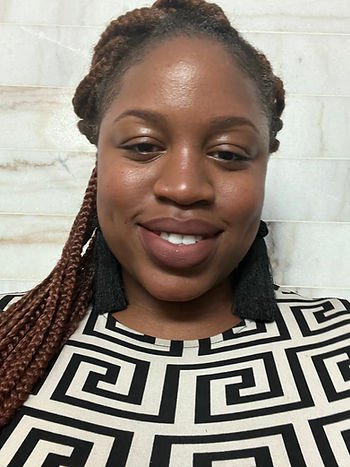Power of Networking Feature: Khadija Kamara
Headshot of Khadija Kamara a Black woman with brown braids
Instead of me sharing a reflection or discussing a public health issue, the next few posts will be a mini-series focusing on the power of networking in connecting young Sierra Leonean women in the public health field. This series is going to share with you more about the organizers of the State of Salone Women's Health Event who are some amazing Salone women I was able to connect with via LinkedIn networking. The series will start off with Khadija!
Tell me about your interest in public health, your academic degrees/experiences, and some of your major accomplishments.
In the Fall of 2017, I went to Sierra Leone (my motherland) for the first time in my adult life. It COMPLETELY changed my life. The experience opened my eyes to the daily reality of inequity. Sierra Leone’s economic polarization is widely visible. I was fascinated by the ingenuity, beauty, resourcefulness, and overall brilliance of the Sierra Leonean people, my people. Those 7 days in Sierra Leone made me fall madly in love with African development, in fact, I decided to devote my life to it. I knew I wanted to help build African infrastructure and bring Mama Africa to her rightful glory. I just didn’t know how to go about it.
When I came back to America, I knew I needed to do something to help build Salone (as Sierra Leoneans lovingly call Sierra Leone). I didn’t know what I was going to do, or how I was going to do it, but I knew I would do it. I had heard of the Davis 100 Projects for Peace grant at my school which provided grant funding for a development project every year. I was excited! This was what I was looking for. I formed a trio of West African Women and we applied for the grant…but weren’t selected. I was confused. At the time I thought my idea to ship medical supplies to Sierra Leone would help health outcomes. I didn’t understand the concept of sustainable project development.
I learned public health values and principles piece by piece from international and domestic professors, community-based organizations, international agencies, community members, etc. With a new treasure chest of knowledge and tools, I reapplied for the Project for Peace competition in January 2019. We won the competition! Project Uman Na Power (Woman is Power!) aimed to empower women and girls by destigmatizing menstruation and distributing over 1800 reusable menstrual pads and conducting numerous community conversations that also included men and boys. By developing this project I realized my passion was designing and implementing community-based, data-driven, sustainable, health-improving strategies in partnership with community stakeholders. This project led me to attain a Master of Public Health where I learned the fundamentals of strategy development and implementation.
"How can people help build infrastructure if they don’t have health (physical, mental, emotional, etc.) to do so?"
We connected through LinkedIn, how useful have you found social media to connect with individuals in the public health space and other Sierra Leoneans/Africans?
LinkedIn has been very helpful in progressing my career and growing my network with other Sierra Leoneans and Africans around the world. The Sierra Leonean public health sphere is quite small, so it’s nice to have an easier way of connecting with other changemakers. I met many other passionate Sierra Leoneans that live in New York City, where I’m currently based, through LinkedIn. They introduced me to incredible opportunities and others in their network. Unity and supporting one another are so important. I’m looking forward to further growing the Sierra Leonean public health community.
What do you hope for the future of public health in Sierra Leone and how do you see yourself contributing to that?
Every single person, every single Sierra Leonean deserves the right to affordable, quality health care. I hope healthcare providers can be enabled to provide quality health care, hospitals are equipped and maintained to provide healthcare, and Sierra Leoneans can live long and healthy lives. How can people help build infrastructure if they don’t have health (physical, mental, emotional, etc.) to do so?
Do you see yourself working in Sierra Leone in the future?
I definitely see myself working in Sierra Leone in the near future. My heart is in Salone. I feel I have a part to play in building infrastructure.
Any plugs for projects you are working on or where people can connect with you?
Currently, we have an upcoming webinar ‘The State of Salone Women’s Health’ that I am developing alongside Jonta Kamara, Eunice Mustapha and Fatu Amara. This will be incredible as we will have panelists—from a range of backgrounds—speaking about the State of Sierra Leonean women’s health historically, presently and in the future.
*Note: answers were completed prior to the webinar
3 words for what you hope to see in public health in Sierra Leone
Quality, Access and Affordability
Stay tuned to meet the rest of the event organizers!
